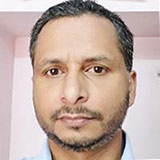Indian Christians fight media attacks on missionaries
‘Wild and unsubstantiated’ allegations aim to tarnish the Christian community for political gains, says priest
 Saji Thomas, Bhopal
Saji Thomas, Bhopal
Christians in central India’s Madhya Pradesh state are busy fighting a new trend in local Hindi-language media of publishing fabricated stories aiming to tarnish missionaries’ image.
A delegation of Christians met the editor of a mass-circulation daily in the state on Oct. 28 after it ran a series of articles that accused missioners of engaging in a dangerous game of converting tribal and socially poor Dalit people with foreign funding.
Bishop Chacko Thottumarickal of Indore, who led the delegation to meet the editor of Nai Duniya (new world), said articles appeared in the daily in September and October “maligning the Christian community.”
“Initially, we did not bother, but when it continued to publish defamatory articles against us without any base, we thought it appropriate to inform the editor about our concerns,” Bishop Thottumarickal told UCA News on Oct. 29.
“We want the editor to take corrective measures and avoid publishing baseless articles against a community and creating ill will.”
He said his diocese was consulting a team of experts “to take legal remedies if the paper continued spitting anti-Christian venom.”
The editor promised the delegation that he would convey their concerns to newspaper’s top management, the bishop said.
The newspaper, started in 1947, has six editions in Madhya Pradesh and neighboring Chhattisgarh state. With 1.6 million readers, it is considered central India’s most popular daily in Hindi, the region’s common language.
Some Christian leaders said the newspaper seems to have changed its editorial policy since 2012, when publishers of Dainik Jagran (daily vigil), India’s largest-read Hindi newspaper, acquired its major shares.
An atmosphere of intolerance against Christians and their mission has prevailed across India since the pro-Hindu Bharatiya Janata Party (BJP) came to power in New Delhi in 2014 and made political gains in several states.
Hindu groups and publications that support the BJP consider the political victory a mandate to push for their idea of making India a Hindu-only nation by vanquishing religious minorities to the social margins.
‘Wild, unsubstantiated allegations’
One article in the daily headlined “Stop the dangerous game of missionaries” called for a blanket ban on Christians receiving foreign funding and on missionary activities in the region.
It argued that Christians receive money from overseas for charitable purposes but use it for proselytizing poor indigenous and Dalit people.
Another article accused Christians of “playing with the faith” of Hindus “under the garb of service.” Religious conversion is dangerous for national unity as it would change people’s focus from their land and culture, it said.
Other articles in a similar tone presented missioners as evils “in a bid to inject slow poison in the minds of the people to think Christian charities are meant for religious conversion,” said Father Babu Joseph, a former spokesperson of the Catholic Bishops’ Conference of India (CBCI).
He said statistics and data would prove all these allegations wrong. Christian missioners have been working in the area for more than a century but Christians’ overall population has not increased by more than 1 percent in central India.
Nationally, Christians make up 2.3 percent of India’s 1.3 billion population, according to the 2011 census. Contrary to claims, the Christian population declined from 2.6 percent in 1971 to 2.3 percent in 2011, he noted.
Thousands of students, mostly non-Christians, pass through Christian educational institutions every year. “Had we converted 1 percent of them each year, the situation would have been different,” he said.
All the central Indian states have laws that criminalize conversion without government permission. For example, such a law has been in force in Madhya Pradesh since 1968.
“But not even a single pastor, Catholic or non-Catholic, has been convicted of conversion yet in any part of India,” said Father Joseph, who was part of the delegation that met the editor.
Christians receive foreign funding just as other communities, through state-regulated channels, and follow strict laws and banking scrutiny. Income and expenditure are also annually audited following government norms, he said.
“When there is more than enough scrutiny on receipt and deployment of foreign funds, it is totally unbecoming of some organizations to make these allegations against Christians,” said Father Joseph.
He said the “wild and unsubstantiated allegations aim to tarnish the Christian community. They aim to divide people of different faiths for political gains.”




